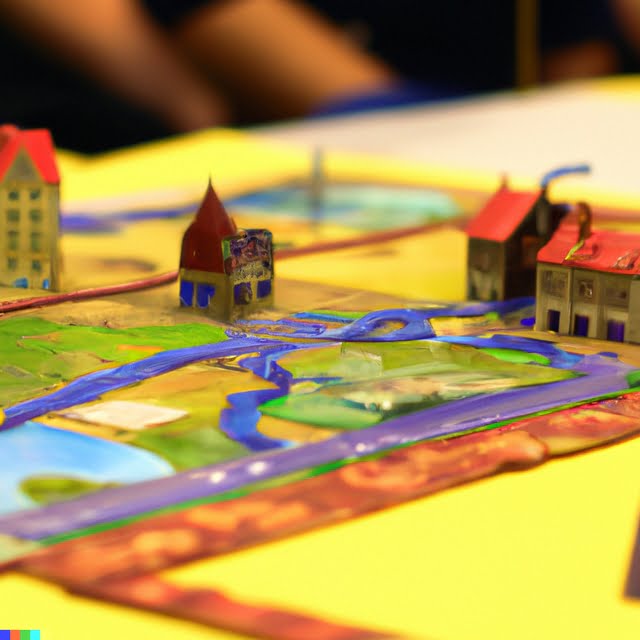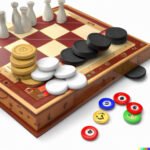Introduction
Board games have been popular for centuries, and now they are finding a new home in libraries. Libraries around the country are recognizing their potential to bring people together, facilitate learning, and inspire creativity. In a library setting, board games can be used as an engaging and educational activity that appeal to patrons of all ages.
Many libraries have begun establishing board game collections to accommodate the demands of their communities. In addition to providing a fun activity for patrons, these collections offer an avenue for expanding learning beyond the bookshelves. Board games provide opportunities for team-building, problem solving, and critical thinking; they allow players to work out interpersonal relationships while negotiating their way through exciting challenges. Games also encourage conversation while playing on topics such as teamwork, social skills development, spatial reasoning, history and even foreign languages ” turning simple play into something much more meaningful.
Including board games in libraries is a smart idea that has already proven beneficial in many settings. Studies have shown that board game play helps build reading comprehension by sharpening players’ skills in visualizing images; math skills by encouraging counting and data analysis; communication skills by requiring concise explanation; as well as strategic thinking while navigating decision-making processes within certain rules or constraints. The use of board games provides multiple opportunities for developing problem-solving abilities, collaboration skills, financial literacy education and more ” making it an effective tool for teaching basic academic concepts without ever stepping foot inside a traditional classroom.
Of course, there is no need to limit the selection of board games offered in libraries only to those with educational value”all manner of classics like Monopoly and Scrabble are available too! By having multiple types of board games on hand at any given time (as suggested by The American Library Association), libraries can ensure that there is something exciting and entertaining waiting anytime patrons visit”be it lunchtime during adult Wellness Wednesdays or during afterschool programs for kids ” creating delightful experiences with lasting impact to boot!
Cultivating Knowledge
Board games offer an interactive opportunity to educate and inform curious minds. Traditional learning can be boring, so introducing increasing amounts of play into the classroom or library ensures greater interest and retention of information. Board games in libraries help us learn skills such as critical thinking, math, resilience, and strategic planning as we navigate a variety of game rules and scenarios. The interpersonal exchanges that come with playing board games also serve to sharpen our communication skills and provide life lessons regarding fair play and cooperation with others.
As board games become increasingly popular in education settings, educators are discovering the multiple educational benefits these tools offer students. Through the cooperative nature of board gaming, students learn about listening and responding to each other, respecting diverse opinions, solving problems collaboratively, reflecting on moves made by their opponents, dealing with consequences from bad decisions,re-strategizing when faced with setbacks or new emergent scenarios, generating unique ideas for overcoming obstacles quickly, handling wins and losses gracefully ” all that within the purposeful framework of fun & entertainment. By leaning into this playful medium as part of lesson plans or library resources we can deepen our understanding of concepts taught in classes – providing a more comprehensive approach to knowledge acquisition which reinforces skills in mathematics,, decision-making etc.
In addition to helping inculcate cognitive development outside regular class lectures , board games provide an invaluable social component that helps young people understand empathy. Players become emotionally invested in their characters’ successes and failures while fulfilling collective objectives within the game context ” enhancing interpersonal relationships that add an emotional dimension to character development over time. Playing together creates bonds between players based on trust that ultimately develops into lasting friendships; these social experiences also have tremendous power in encouraging creativity since younger players often come up with innovative game strategies during gameplay sessions. As they take risks while playing they also gain confidence which prepares them for issues they may face outside the classroom or library setting .
Fostering Community
Board games are gaining popularity in libraries as social recreational outlets for patrons. By providing board game collections and hosting tournament dates, libraries have become centers of entertainment while encouraging the notion of cooperation. Cooperative play promotes social exploration, conversation growth and teambuilding techniques that can burly foster active community engagement. Morally, it helps build character traits such as selflessness, caring nature and resilience in all age groups. Culturally, it allows members to celebrate different traditions and discover heritage through games played around the world. Economically, it gives individuals the experience of negotiating and trading resources to gain a competitive edge without leading to monetary gains.
Library board game tournaments also create opportunities to break down social boundaries by forming networks between diverse patrons who are looking for lighthearted fun with family, friends or neighbors on even terms. Additionally, playing together can promote collaborative approaches to problem-solving skills involving emotion regulation and compromise building; allowing participants an outlet for experimentation with both competitive challenges and empathy building. Board games provide an inclusive atmosphere where everyone has the opportunity to participate around a common task regardless of background or disposition, creating a leveled playing field in which everyone can exercise their creativity safely no matter their level of skill, knowledge or condition. Ultimately, this type of activity embraces new ideas from every person present so that unique solutions can be available to propel collective progress
Active Learning
Board games increase engagement and participation at the library. Strategies like roleplaying, problem-solving and critical thinking are all encouraged during game play. Not to mention, the competitive or cooperative atmosphere these games create foster learning skills that can be extremely helpful in other areas. Board games can be an effective alternative to traditional lectures or instruction when teaching new concepts, while providing an interactive environment which keeps participants interested and engaged.
Furthermore, board games provide plenty of variety when introducing new topics to patrons. Instead of relying on words alone, they allow us to engage multiple senses on a deeper level. This combination of tactile and visual elements is one of the major advantages that board games have over more passive forms of learning. They allow librarians to reach younger audiences who may find literature-based activities too challenging or boring.
In addition, board games can be used as a collaborative experience throughout different age groups or educational levels, as well as a way for people around the same age to socialize in a safe setting outside school or home. It also provides an opportunity for discussion around conversations which might otherwise not occur if left solely up to classrooms/academic settings. Games such as “cultural crossroads” promote dialogue among players while they learn about each other’s cultural backgrounds through stories they share with their friends during game play.
Board games provide countless benefits in libraries and give librarians ample opportunity to educate kids through fun-filled activities related to every subject under the sun! From math problems like solving puzzles, science experiments with Chem-Mixes and astrophysic modules, language quizzes with Fun French Phrases or creative writing challenges using Story Cubes, there are tons of opportunities for librarians to utilize board game boards as effective teaching tools in their programs and workshops!
Developing Literacy
Board games in the library offer a creative way to engage students and promote literacy. The potential for fun-filled exploration of books and games provides a strong incentive for children to develop their reading and writing skills. Games like Scrabble encourage teamwork, as students work together to increase their word knowledge. Other activities like puzzles, bingo, and spin the wheel can help diversify language practice and build critical thinking. Through careful invigoration of the available materials within libraries, kids can foster an appreciation for words through these various activities as they create positive experiences with reading. Furthermore, board games are interactive, allow for ample participation at any level, and encourage socialization – making them an ideal addition to any library setting!
Informing Through Exploration
Board games offer an excellent opportunity for students to visit the library and interact with their peers in a fun and engaging learning environment. Board games have been shown to promote reading enlightenment, as well as facilitate intergenerational connections through shared experiences. Additionally, board games help encourage meaningful conversations about a variety of topics, allowing students to further explore and expand upon their knowledge base on a particular subject.
Board game nights at libraries provides a great platform for developing friendships and sparking new ideas with students from all backgrounds. During these events, librarians bring out a variety of board games based on specific themes or topics that are associated with literature within the library’s collection. Through cooperative group and competitive activities, each student is encouraged to express their individual understanding and create meaningful discourse while concurrently enjoying the challenge of the game.
The fun environment of library board game evenings creates an atmosphere in which both children and adults can collectively build understanding while playing classic strategic games such as Chess, Go or Othello. Discussions often ensue among participants, helping those present think critically about real-life dilemmas pertaining to a chosen book or topic. Library board game evenings not only entertain but also provide mental stimulation by helping students think logically as they practice problem solving with predictions about best possible moves and strategies for winning against opponents. Issues are identified as part of each game and explored during playtime allowing participants ample time to consider end solutions prior to making final decisions that could determine whether they succeed or fail. Finally, playing board games promotes social awareness while infusing collaborative activities that aid interpersonal relationships among participants who might otherwise remain unacquainted if not brought together through the love of both books and games!
Developing Skills Together
Board games in libraries help to support a shared sense of accountability and loyalty that lets kids learn important life lessons like working towards a common goal and communication. When children play together, they must cooperate to decide how the game will be played, create strategies for winning, and resolve disagreements when they arise. Playing board games with people of different ages can also help to strengthen relationships between adults and kids as well as older siblings so that everyone feels connected. Board games help children develop cognitive skills such as problem-solving and critical thinking while allowing opportunities for having fun. Through collaborative activities in the library, the focus shifts from competition to cooperation which helps bring out the best in everyone involved. Kids are challenged to work collaboratively while using their knowledge, skills, and creativity to come up with solutions making them a great way to break boundaries of age or ability level. Additionally, playing board games provides an opportunity for families and friends to socialize beyond watching television or scrolling through their phones. This can make libraries more welcoming places where people can build strong ties and nurture friendships amongst patrons of all ages.
Conclusion
Board games are making a comeback and libraries should be taking notice. Board games can be used to attract different types of library patrons – from families looking to unplug and spend quality time together to gamers seeking out their favorite titles and newcomers wanting to find new experiences. They also offer an opportunity for libraries to engage with the community, host events, provide much-needed resources, and build bridges between people from all walks of life. By engaging with board gamers in both virtual and real life, libraries can break down barriers that traditional books may not have been able to accomplish and really make an impact on the lives of local residents. With the proper approach, there is huge potential here for transforming the way that libraries think about their role in the local community. The possibilities are only limited by our imagination!

I love playing all kinds of games – from classics like Monopoly to modern favourites like Ticket to Ride.
I created this blog as a way to share my love of board games with others, and provide information on the latest releases and news in the industry.





